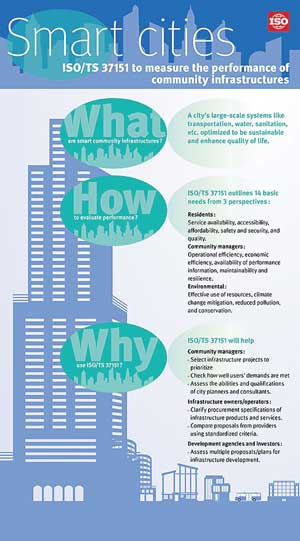Friday Feb 27, 2026
Friday Feb 27, 2026
Thursday, 31 December 2015 00:00 - - {{hitsCtrl.values.hits}}
 Smart cities make sense: they waste less, offer better quality of life and ensure a brighter future for the next generation. But as more and more communities strive to optimize services and become more sustainable, how can they tell if their actions are making a difference? A new ISO technical specification can help them out.
Smart cities make sense: they waste less, offer better quality of life and ensure a brighter future for the next generation. But as more and more communities strive to optimize services and become more sustainable, how can they tell if their actions are making a difference? A new ISO technical specification can help them out.
ISO/TS 37151 outlines 14 categories of basic community needs (from the perspective of residents, city managers and the environment) to measure the performance of smart community infrastructures. These are typical community infrastructures like energy, water, transportation, waste and information and communication technology systems, which have been optimized with sustainable development and resilience in mind.
Not only will the metrics in ISO/TS 37151 support city and community managers in planning and measuring performance, they will help compare and select procurement proposals for products and services geared at improving community infrastructures.
Dr. Yoshiaki Ichikawa, Chair of the subcommittee that developed the standard (ISO/TC 268/SC 1), says: “Prior to starting this project, the subcommittee spent quite a bit of time evaluating the already existing processes and metrics for smart community infrastructures. We found that some of the methodologies were not publicly available, and that though helpful, their complexity, redundancy and lack of transparency made it difficult for public and private managers (e.g. governments, city planners, operators of community infrastructure) to evaluate and implement proposals, plans and performance consistently and fairly. It was clear that globally harmonized metrics were needed. That is when we started to work on ISO/TS 37151.”
Who should use the standard? The document is geared towards community managers including mayors, city officials and elected officers, infrastructure owners and operators, and development agencies and investors.
The Secretariat of ISO/TC 268/SC 1 is managed by the ISO member for Japan, JISC.